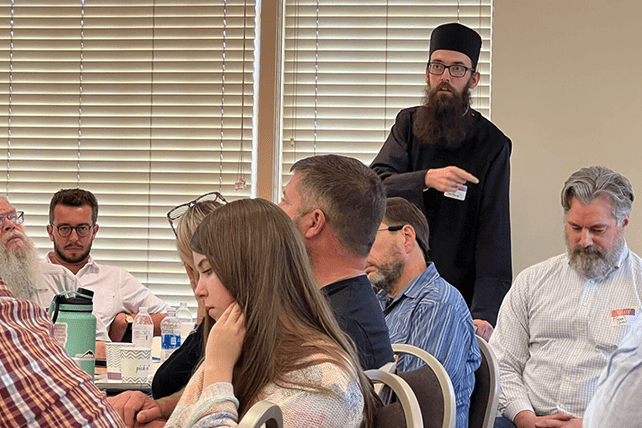The Rev. John Whiteford, the other co-founder of the fellowship, is a priest in Spring, Texas, at St. Jonah Russian Orthodox Church, also ROCOR, which doubled during the pandemic to about 150 weekly attendees, he said. In his address Saturday, Whiteford emphasized that Southern culture and American culture are different.
“The American way is to impose our democracy and make everyone like us … but not everyone wants to be American,” he said from a podium. “The foreign policy of the South generally has been isolationist … but America provokes incidents, starts wars.”
Whiteford didn’t mention the Russian invasion of Ukraine but has written on his blog why he believes NATO and the U.S. provoked Russia. In his speech, he also said that American culture’s materialism and capitalism are in contrast to the South’s past agrarianism. Recently returned from a trip to several Moldovan villages, he made the case for why Orthodox Christians should garden and farm.
“If we can have land to raise chickens and goats, we should, because kids who grow up around farm animals have the sense to know male and female,” he quipped.
All of the event’s speakers oppose same-sex marriages and argue that its legalization is having negative effects on traditional families.
“If there is a distinctive American culture it is Disney media, consumerism and sodomy,” said Whiteford.
Metropolitan Jonah Paffhausen, a retired bishop of ROCOR and rector of St. Herman of Alaska Orthodox Church in Stafford, Virginia, who was forced to resign from the Orthodox Church in America in part for comments seen as incendiary, spoke about how the South must combat the “radical ideology” of the North, which he described as formed by socialism and Marxism and based on hatred of God, religion, art, music and the traditional family.
“We have to stand up against this,” he said. “I don’t think standing up in violent revolution is going to do it, but … we have to stand up for the truth.”
Paffhausen also advised that new converts stop arguing about doctrine online, especially in vulgar terms, to show love instead of anger, and to respect non-Orthodox Christian faiths while sharing about Orthodoxy. Both Whiteford and Paffhausen are converts to the faith from Protestant backgrounds, Whiteford from the Church of the Nazarene and Paffhausen from Episcopalianism.
Notably few attendees at the conference were “cradle” Orthodox Christians and clergy who have historically been the preservers of Orthodoxy in the U.S.
Sarah Riccardi-Swartz, a scholar of Orthodoxy in the U.S. and author of “Between Heaven and Russia,” said she receives a lot of emails from Orthodox Christians “who are really concerned about the trajectory of their parishes” and believe converts are pulling their churches into right-wing politics, she said.

